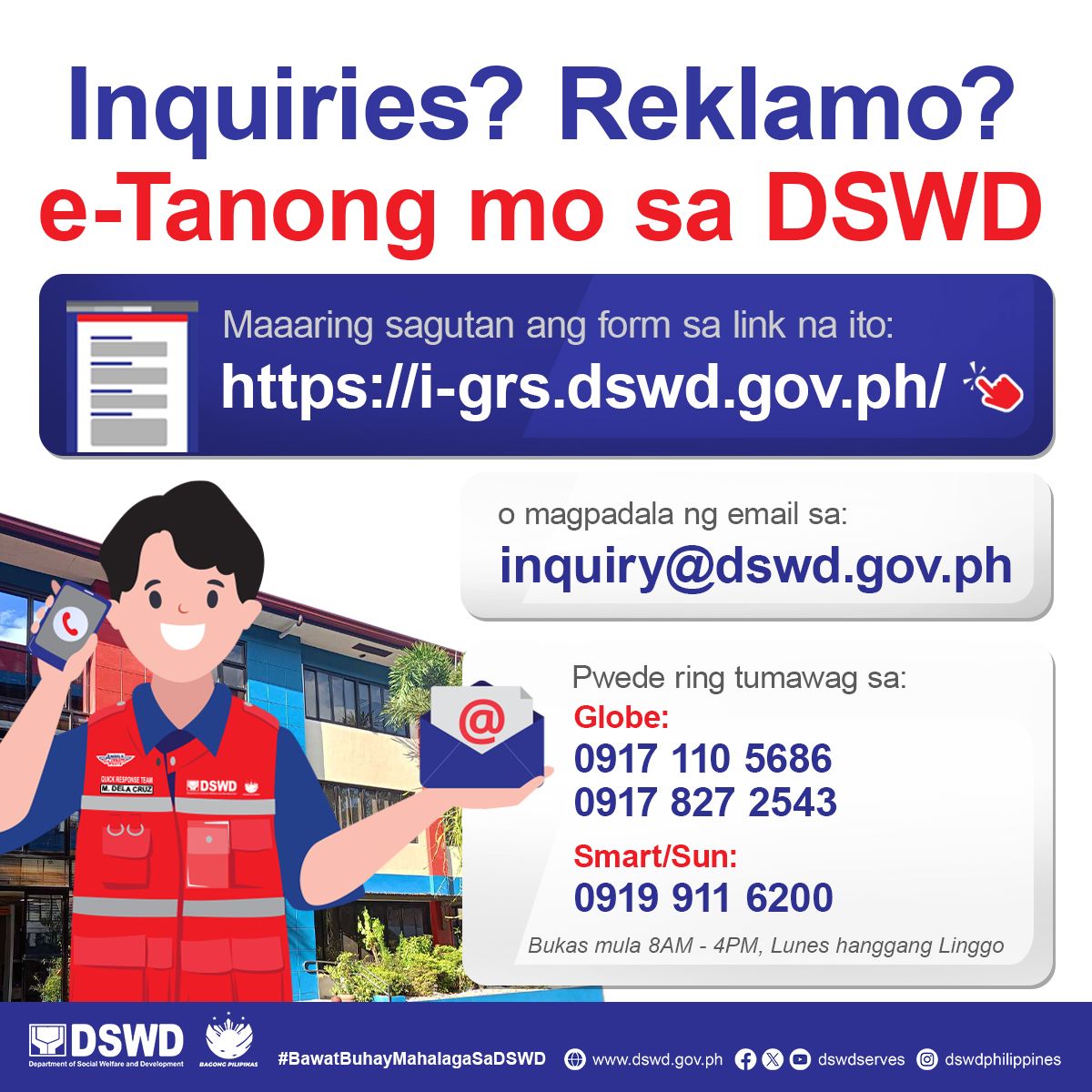The Department of Social Welfare and Development (DSWD), much like the SSS, is a governmental agency in the Philippines responsible for the protection of social welfare rights and the promotion of social development. It works to uplift the living conditions of disadvantaged individuals, families, and communities by implementing various social protection and poverty reduction programs. Through its services, the DSWD addresses issues such as poverty, child welfare, and disaster response, providing essential support to vulnerable populations.
The DSWD supports Filipinos through various initiatives, including cash assistance programs like the Pantawid Pamilyang Pilipino Program (4Ps), which provides conditional cash grants to poor households to improve their health, nutrition, and education. By offering these programs, the DSWD aims to alleviate poverty and provide a safety net for those in need. Understanding the DSWD and its services is crucial for Filipinos as it empowers them to access available support, thereby improving their quality of life and fostering community resilience. In this article, we took a closer look at the DSWD, explored its vision, mission, and core values, and looked up the various cash assistance programs it offers in support of the Filipino people.
Understanding the DSWD
DSWD stands for the Department of Social Welfare and Development (DSWD), a government agency in the Philippines tasked with promoting social welfare and development. It provides programs and services designed to protect and assist the vulnerable, disadvantaged, and marginalized sectors of society. Through initiatives like family welfare, disaster response, and poverty alleviation, the DSWD works to improve the quality of life for all Filipinos, particularly those in the most vulnerable and disadvantaged sectors.
The primary purpose of the DSWD is to ensure that social services are effectively delivered to those in need, thereby fostering an inclusive and equitable society. It addresses various social issues, such as poverty, homelessness, and child welfare, through targeted interventions and partnerships with other agencies and organizations. By fulfilling its mandate, the DSWD aims to create a more resilient and empowered populace capable of contributing positively to national development.
History
The DSWD was established in 1987 through Executive Order No. 123, which reorganized the government’s social welfare programs into a single agency. It emerged from earlier efforts to address social welfare concerns, notably the Department of Social Services and Development (DSSD) and its predecessors. The DSWD’s primary mission has been to lead in the provision of social services and protection for vulnerable populations in the Philippines. Over the years, it has evolved and expanded its programs to address emerging social issues and enhance community welfare.
DSWD Logo
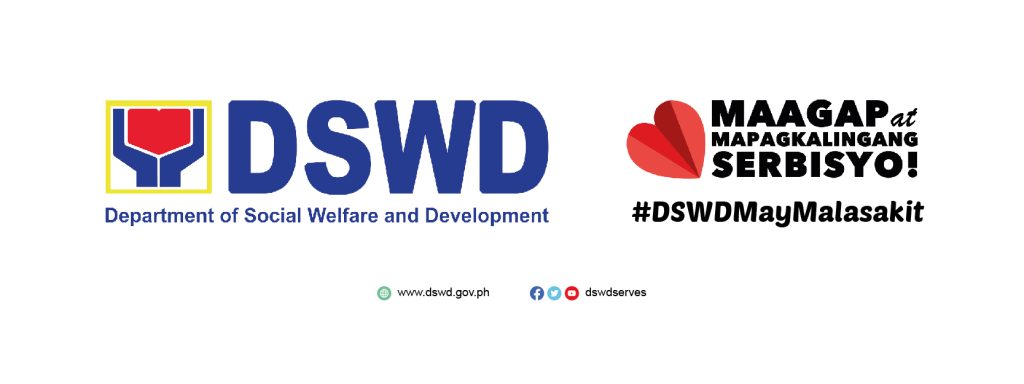
The DSWD logo features two open hands cradling a heart, symbolizing care and protection for those in need. The heart represents compassion and the agency’s commitment to social welfare, while the blue and red colors reflect the national flag, indicating its dedication to serving the Filipino people. This emblem encapsulates the DSWD’s mission to provide support and uplift the lives of disadvantaged individuals and communities.
As a government agency, the DSWD follows the following guiding principles in carrying out its mandate to serve:
Mission
As the authority in the Social Welfare and Development sector, the DSWD develops, implements, enables, and coordinates social welfare policies and programs for and with the poor, vulnerable, and disadvantaged.
Vision
The DSWD envisions an empowered society where the poor, vulnerable, and disadvantaged sectors have immediate and equitable access to opportunities for an improved quality of life.
Core Values and Service Pledge
The DSWD operates under the core values of being maagap at mapagkalinga (prompt and compassionate), mahusay (efficient), and matapat (honest). These values guide the agency’s commitment to delivering quality, prompt, and courteous service, ensuring that all requests are addressed promptly and transparently.
Quality Policy
The DSWD’s Quality Policy is dedicated to the delivery of prompt, compassionate, and innovative social welfare services that effectively address the needs of the most vulnerable sectors of society. It commits to continuous improvement, ensuring that all programs and services meet high standards of quality and efficiency. Through a collaborative and responsive approach, the DSWD strives to foster a society where every Filipino enjoys a dignified and meaningful life.
Mandate
The DSWD is mandated to develop, implement, and coordinate social protection and poverty-reduction solutions for the poor, vulnerable, and disadvantaged sectors. This involves a wide range of programs aimed at improving the living conditions of Filipinos, including disaster relief, educational assistance, health care, and various social welfare initiatives.
Coverage
The DSWD’s coverage spans nationwide, reaching all regions of the Philippines to deliver social welfare programs and services. It caters to various sectors including the poor, vulnerable, and disadvantaged individuals, families, and communities. Through its regional and field offices, the DSWD ensures that assistance and support are accessible even in the most remote and underserved areas.
Programs, Projects, and Services
The DSWD’s comprehensive approach to social welfare ensures that the most vulnerable sectors of society receive the support they need. By implementing a wide range of programs, projects, and services, the agency helps alleviate poverty, improve health and education outcomes, and provide immediate relief in times of crisis. The agency also improves the quality of life for Filipinos, especially the disadvantaged and vulnerable sectors of society. These initiatives cover areas such as social protection, poverty alleviation, disaster response, and community development. The goal is to promote social equity and empower communities to become self-reliant and resilient.
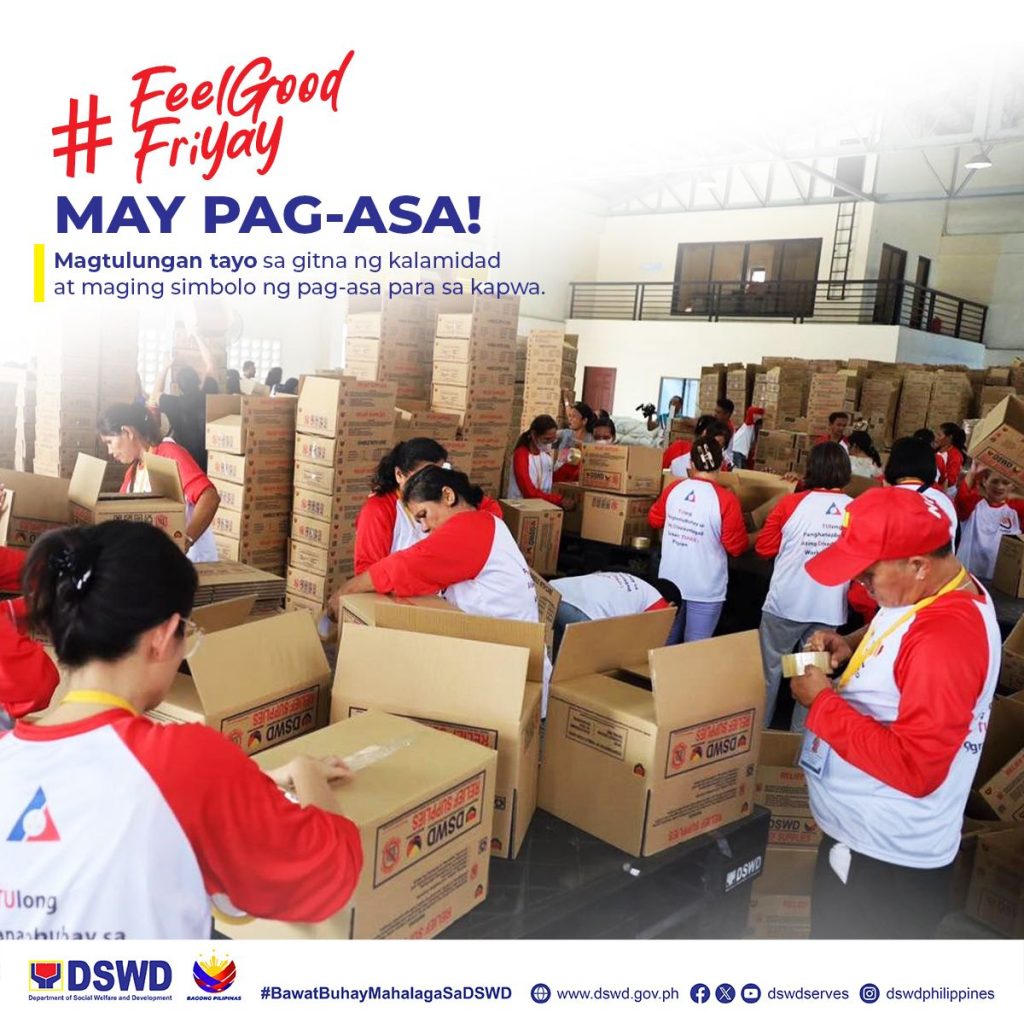
Here are some of the DSWD Initiatives currently in place:
Technical Assistance and Resource Augmentation (TARA) Program
The Technical Assistance and Resource Augmentation (TARA) Program, implemented by the DSWD, aims to facilitate the transfer of technical and organizational expertise to stakeholders. This program also ensures the provision of necessary resources to support the effective implementation of various DSWD programs and projects. It supports the capabilities of local government units, non-government organizations, and other partners.
Development of Social Technologies
The Development of Social Technologies involves a systematic process aimed at creating innovative social welfare and development (SWD) intervention models. The process includes stages such as conceptualization, design formulation, pilot testing, evaluation, documentation, and marketing. This approach also applies to enhancing existing DSWD intervention models to ensure they remain effective and relevant.
Regulatory Services
The DSWD’s regulatory services are responsible for the registration and licensing of agencies and organizations engaged in social welfare and development (SWD) programs. This includes accrediting the SWD programs and services of licensed social work agencies (SWAs) and service providers. The regulatory framework ensures that these organizations meet the necessary standards and provide quality services to beneficiaries.
Pantawid Pamilyang Pilipino Program (4Ps)
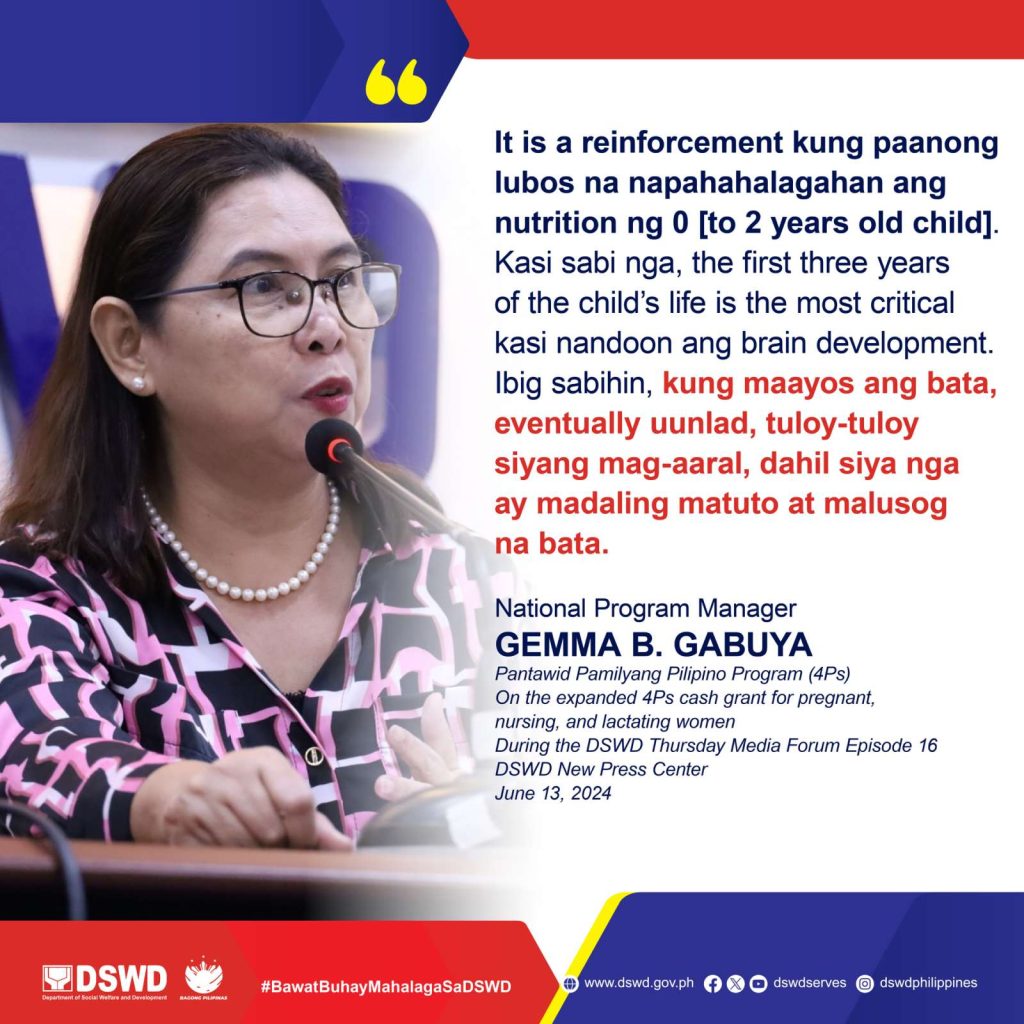
The Pantawid Pamilyang Pilipino Program (4Ps) is a social assistance initiative focused on human development. It invests in the health and education of poor families, particularly those with children aged 0 to 18 years. Beneficiaries receive assistance through a conditional cash transfer scheme aimed at eradicating extreme poverty, promoting education, improving maternal and child health, and achieving gender equality.
Supplementary Feeding Program (SFP)
The Supplementary Feeding Program (SFP) is a government-sponsored initiative by the DSWD that provides additional food to children enrolled in Day Care Centers (DCCs) and Supervised Neighborhood Play (SNP). It targets 3-5-year-old children in DCCs and 2-4-year-old children in SNPs, forming part of the DSWD’s Early Childhood Care and Development (ECCD) program. This initiative aims to improve the nutritional status of young children.
Bangsamoro Umpungan sa Nutrisyon (BangUN) Project
The Bangsamoro Umpungan sa Nutrisyon (BangUN) Project is a nutrition-focused initiative in the Bangsamoro Autonomous Region in Muslim Mindanao (BARMM). It provides food assistance and health education to improve children’s nutrition levels in the region. Activities include distributing fortified rice and Vitamin A capsules, teaching hygiene practices, and promoting breastfeeding and complementary feeding.
Travel Clearance for Minors
This service enables minors under 18 years old to secure a travel clearance from the DSWD Field Office if they are traveling abroad alone or without their parents. The clearance process ensures the safety and welfare of minors traveling overseas, safeguarding them from potential risks.
Recovery and Reintegration Program for Trafficked Persons (RRPTP)
The Recovery and Reintegration Program for Trafficked Persons (RRPTP) offers a comprehensive set of services to meet the psychosocial and economic needs of trafficked persons. The program includes interventions such as counseling, skills training, and financial assistance to help beneficiaries reintegrate into society and rebuild their lives.
Social Pension (SocPen) for Indigent Senior Citizens
The Social Pension (SocPen) program provides a monthly stipend of Php500.00 to indigent senior citizens. This financial assistance helps augment their daily subsistence and medical needs, improving their quality of life and ensuring they receive the care they deserve.
Centenarians Act Implementation
The DSWD Centenarian Program honors Filipino citizens aged 100 years and above, recognizing their valuable contributions to society. The program provides a one-time cash gift and a congratulatory letter from the President of the Philippines as a token of appreciation.
Programs and Services for Persons with Disabilities
Under RA 10754, the DSWD offers social protection and assistance to persons with disabilities (PWDs). These services aim to improve their quality of life, ensure equal opportunities, and promote their inclusion in society.
Assistance to Individuals in Crisis Situations (AICS)
The AICS program provides various forms of assistance to individuals, families, and communities facing crisis or challenging situations. This includes financial aid, food, and other necessities to help them cope with emergencies and recover from adverse conditions.
Comprehensive Program for Street Children, Street Families, and Indigenous People
This integrated program addresses the needs of street children, street families, and Indigenous Peoples living in urban areas. It provides a package of services and interventions to improve their living conditions and facilitate their reintegration into mainstream society.
Residential and Non-Residential Care Program
The DSWD operates residential and non-residential care facilities offering 24-hour services to poor, vulnerable, and disadvantaged individuals. These facilities provide alternative family care arrangements and necessary interventions to support their well-being and development.
National Household Targeting System for Poverty Reduction (NHTS-PR) or Listahanan
The NHTS-PR is a data management system used by the DSWD to identify and locate poor households in the country. This system helps target beneficiaries for various social protection programs, ensuring that assistance reaches those who need it most.
Lingap at Gabay Para (LinGaP) sa May Sakit (MaSa)
The LinGaP sa MaSa program provides financial assistance to patients struggling with the high cost of medical treatment for serious illnesses. This includes support for purchasing prostheses, assistive devices, and funding for radiology and chemotherapy treatments.
Disaster Risk Reduction and Management Program
This program encompasses DSWD’s emergency response and long-term strategies to reduce community vulnerability to disasters. It involves preparedness, mitigation, response, and recovery activities to protect and assist affected populations.
KALAHI-CIDSS-National Community Driven Development Program (KC-NCDDP)
The KALAHI-CIDSS program empowers communities through direct participation in projects aimed at reducing poverty. It facilitates asset reforms, human development services, capacity building, and governance engagement, promoting sustainable development at the grassroots level.
Sustainable Livelihood Program (SLP)
The SLP is a community-based capacity-building program designed to improve the socioeconomic status of poor and vulnerable households. It offers two tracks: Microenterprise Development and Employment Facilitation, helping participants acquire assets or find employment to sustain their livelihoods.
Yakap Bayan After Care Program
The Yakap Bayan After Care Program supports recovering persons who used drugs (RPWUDs) in maintaining a lifestyle change post-rehabilitation. It involves family, community, and local government unit (LGU) support to ensure sustainable recovery and prevent stigma.
Payapa at Masaganang Pamayanan (PAMANA) Program
The PAMANA program aims to enhance access to basic social services and promote responsive governance in underprivileged communities. It focuses on conflict-affected areas, working towards peace and development through inclusive and participatory approaches.
Targeted Cash Transfer (TCT) Program
The TCT Program provides cash transfers to households most affected by economic shocks. Beneficiaries receive Php500.00 per month for six months, helping them cope with financial challenges and improve their economic stability.
DSWD eServices
The DSWD eServices provide online platforms to streamline various administrative processes and enhance accessibility for the public. These services facilitate efficient handling of requests and transactions related to social welfare and development. By leveraging technology, DSWD aims to improve service delivery and ensure greater transparency.
Knowledge Management Portal (KM Portal)
The Knowledge Management Portal (KM Portal) is an online platform designed to manage and share valuable information related to social welfare and development. It serves as a repository for best practices, research findings, and other relevant knowledge, aiding in the dissemination of critical information to stakeholders and the public.
eServices
Travel Clearance for Minors Travelling Abroad
This eService allows guardians and parents to apply for a travel clearance online for minors traveling abroad alone or without their parents. The digital application process simplifies the clearance acquisition, ensuring that travel documentation is processed efficiently.
Registration, Licensing, and Accreditation of Social Welfare and Development Agencies (SWDAs) and Service Providers (SPs)
This eService facilitates the online registration, licensing, and accreditation of social welfare and development agencies and service providers. It streamlines the process for agencies and service providers to comply with regulatory requirements, ensuring they meet the standards set by the DSWD for delivering quality social services.
Additional Initiatives
The DSWD also undertakes additional projects and initiatives to address specific needs and enhance the effectiveness of social welfare programs. These programs mostly focus on improving community support, managing grievances, and providing targeted assistance to vulnerable populations.
DSWD Angels in Red Vest
The “Angels in Red Vest” initiative involves deploying DSWD staff and volunteers in red vests to provide immediate assistance and support during emergencies and community events. These personnel are trained to offer on-the-spot help, including distributing relief goods and providing information, ensuring quick response and support in times of crisis.
Integrated Grievance Redress Management System (IGRMS)
The Integrated Grievance Redress Management System (IGRMS) is an online platform designed to address and manage complaints and grievances related to DSWD services. It provides a streamlined process for users to submit concerns, track their status, and receive resolutions, enhancing transparency and accountability in service delivery.
Food Stamp Program
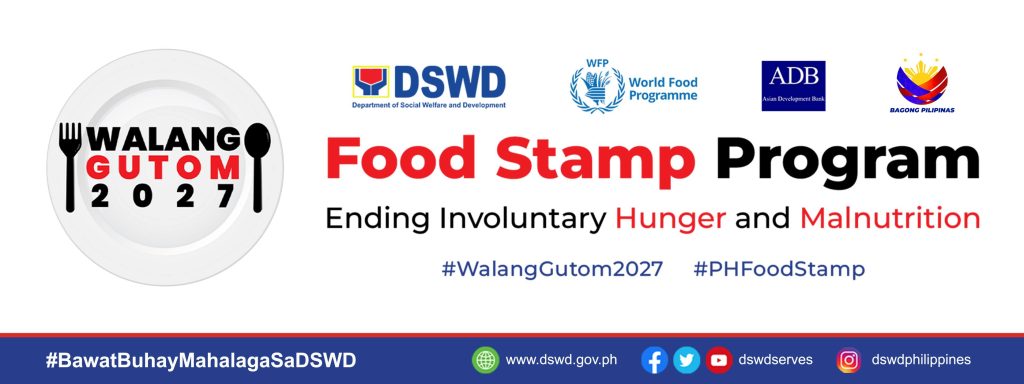
The Food Stamp Program aims to provide food assistance to low-income families through the distribution of food stamps or vouchers. These stamps can be redeemed for essential food items, helping to alleviate food insecurity and support families in meeting their nutritional needs.
Oplan Pag-Abot
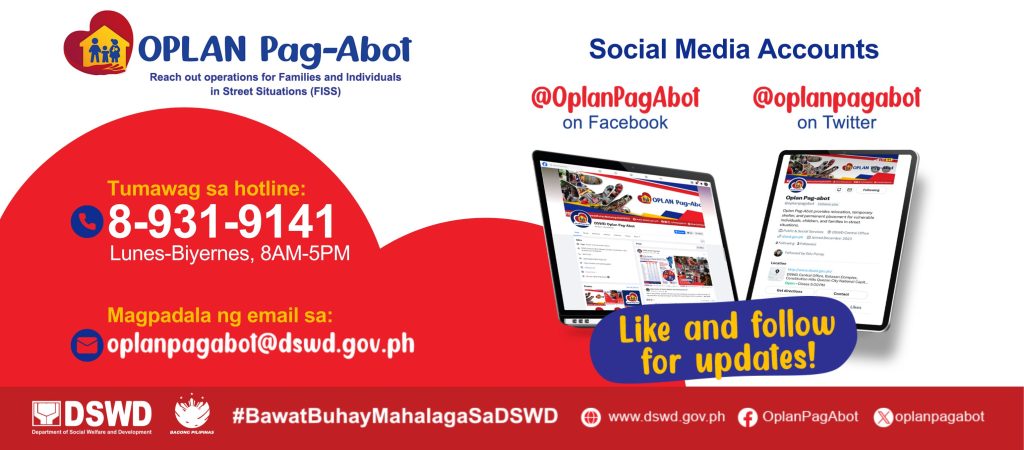
Oplan Pag-Abot is a community outreach initiative focused on reaching out to the most marginalized and underserved populations. The program involves organizing mobile services and assistance campaigns to ensure that social welfare services are accessible to remote or difficult-to-reach areas.
TaraBasa PH
TaraBasa PH is a tutoring program designed to promote literacy and improve the reading skills of students in public schools by making reading and learning materials and reading tutors readily available to students and educators across the Philippines.
Video: DSWD Core Value Number 1
The DSWD’s core value of ‘maagap at mapagkalingang serbisyo’ highlights the importance of timely and compassionate public service. This principle underscores the commitment to delivering swift and effective support, particularly in disaster relief and recovery.
It emphasizes the collaboration between local government units (LGUs) and DSWD in addressing the needs of affected communities and aiding in their recovery. Watch this video from dswdserves to see how the agency carries out its mandates while striving to embody this core value:
Summary
The DSWD is the primary agency responsible for the Philippines’ social welfare system. Through its vision, mission, and dedicated programs, the agency works tirelessly to uplift the lives of Filipinos, particularly the poor and disadvantaged. The cash assistance programs offered by the DSWD provide essential support to those in need, helping to create a more equitable and empowered society.
Contact Information
For more information about the DSWD and its programs, visit their official website or contact your local DSWD office. You may also reach out via the following:
Department of Social Welfare and Development
Main HQ Office Address: DSWD Building, Constitution Hills, Batasan Complex, Quezon City, PH 1126
Tel. No.: (632) 8931-8101 to 07, 09171105686 and 09178272543 (Globe), 09199116200 (Smart)
Email Address: inquiry@dswd.gov.ph
Official website: https://www.dswd.gov.ph/
Official Social Media Pages:
Facebook/Twitter/Youtube: dswdserves
Instagram: dwsdphilippines
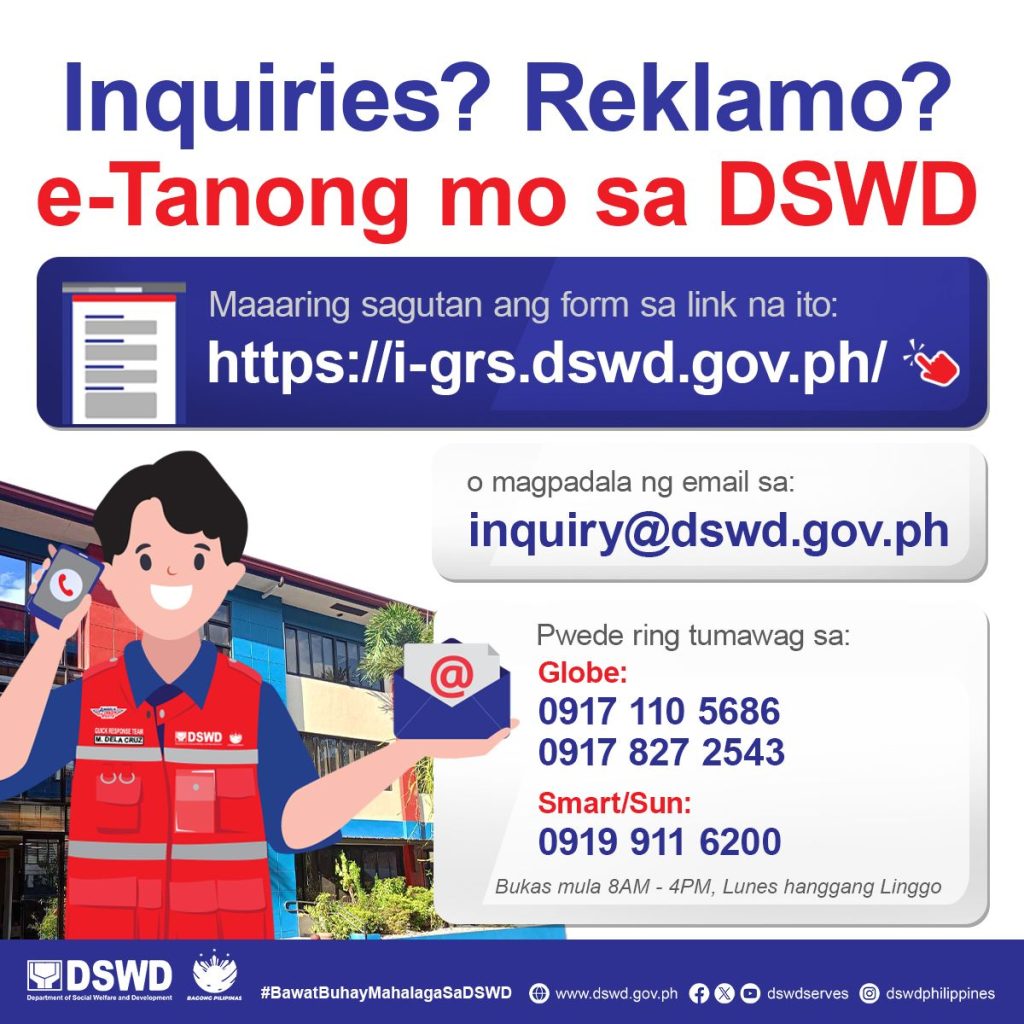
For feedbacks and complaints,
Contact info: (+02) 8-931-8101 VoIP 10212, 10214,
10206
Email Address: inquiry@dswd.gov.ph
For inquiries and follow-up,
Contact number: (+02) 8-931-8101 VoIP 10212, 10214, 10206
Email Address: inquiry@dswd.gov.ph.
Anti Red Tape Authority (ARTA)
Contact number: 8478–5091 or 8478–5093
Email Address: complaints@arta.gov.ph
Presidential Action Center (PACe)
Contact number: 8736-8645, 8736-8603, 8736-8606, 8736-8629, 8736-8621
Hotline 8888 or 82498310 loc. 8175 or 8182
Email Address: pace@op.gov.ph
Contact Center ng Bayan (CCB)
Contact number: 0908-881-6565
Email Address: email@contactcenterngbayan.gov.ph
